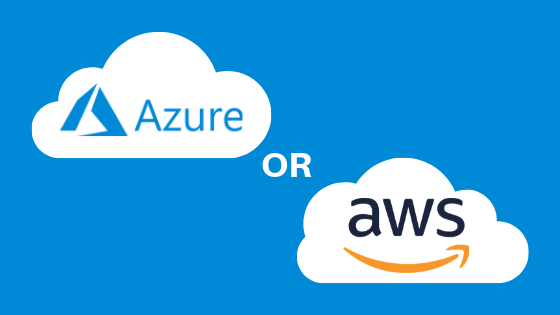It’s not too long ago that the conversation around cloud services was, “they’re coming, so get ready.”
Today, clouds are normal, and we use it in our personal lives and in business. In fact, it’s predicted that spending on cloud services will more than double from $229 billion in 2019 to around $500 billion by 2023. Well, there are three major players in the cloud services world: AWS (Amazon Web Services), Google Cloud Platform (Google’s offering) and Microsoft Azure. We will be talking about AWS and Azure only. Although AWS is the public cloud market share leader, Azure is making gains and is the perfect choice for larger organisations already using Microsoft products.
Let’s take a look at some of the reasons why Microsoft Azure is better than AWS. But first let’s see…
What is AZURE?
Microsoft Azure, often referred to as Azure, is a cloud computing service operated by Microsoft for application management via Microsoft-managed data centers. Azure was launched in 2010 and it emerges as one of the biggest commercial cloud service providers. It offers a wide range of integrated cloud services and functionalities such as analytics, computing, networking, database, storage, mobile and web applications that seamlessly integrate with your environment in order to achieve efficiency and scalability.
What is AWS?
Amazon Web Services, Inc. is a subsidiary of Amazon that provides on-demand cloud computing platforms and APIs to individuals, companies, and governments, on a metered pay-as-you-go basis. AWS services are designed in such a way that they work with each other and produce a scalable and efficient outcome. AWS offering services are categorized into 3 types such as Infrastructure as a service (IaaS), software as a service (SaaS) and platform as a service (PaaS). AWS was launched in 2006 and became the best cloud platform among currently available cloud platforms. Cloud platforms offer various advantages such as management overhead reduction, cost minimization, etc.
Key Differences
Value and Cost-effectiveness
Azure is a natural choice for thousands of organisations that are already Microsoft houses. Most enterprise-level companies already use and are familiar with the Microsoft suite, and generally have an Enterprise Agreement in place. When this is the case, Azure offers cost-savings compared to AWS through discounts on licensing for Azure. You can also use your existing Windows Server and SQL Server licences with Software Assurance to pay a reduced rate when moving to Azure. It also allows companies to get more value from their existing Microsoft investment through full integration with Office 365 and Active Directory. For companies moving their Windows Server to the cloud, Microsoft has offers such as extended security updates included in the cost.
AWS follows pay as you go and they charge per hour whereas Azure also follows pay as you go model and they charge per minute which provides more exact pricing model than AWS.
PaaS Capabilities
Both Azure and AWS offer similar IaaS capabilities for virtual machines, networking, and storage. However, Azure provides stronger PaaS capabilities which is an important piece of Cloud infrastructure today.
Microsoft Azure PaaS provides application developers with the environment, tools, and building blocks that they need to rapidly build and deploy new cloud services. It also provides the vital ‘dev-ops’ connections which are important for monitoring, managing, and continually fine tuning those apps. With Azure PaaS, much of the infrastructure management is taken care of behind the scenes by Microsoft. Thus, Azure development allows for a 100% focus on innovation.
Security
From a security perspective, Microsoft is for industry-leading security than the Amazon. They were recognised as a Leader in security. Microsoft’s security is so robust it’s trusted by government bodies as well as enterprises; 95% of fortune 500 companies use Azure. 8 trillion threat signals are analysed by Microsoft every day, with more than $1 billion dollars spent each year on security research and development. Azure also provides more than 90 compliance offerings and is the most trusted cloud by US government agencies.
.Net Compatibility
Azure’s compatibility with the .Net programming language is one of the most useful benefits of Azure, which gives Microsoft a clear upper hand over AWS and the rest of the competitors. Azure has been built and optimized to work consistently with both old and new applications developed using the .Net programming framework. It is much easier and straightforward for enterprises to move their Windows apps to Azure Cloud as opposed to AWS or others. Thus for the several organizations that use .Net based enterprise apps, Azure is the obvious choice.
Cloud Connectivity & Performance
While Amazon is still testing the hybrid waters, Azure already has its hybrid capabilities in place. It seamlessly connects datacenters to the Cloud. Azure provides a consistent platform which facilities easy mobility between on-premises and the public Cloud.
Unlike AWS, hybrid apps can be developed on Azure which can take advantage of the resources available within datacenters, at the service provider’s end, or within Azure itself. Azure also provides a broader range of hybrid connections including virtual private networks (VPNs), caches, content delivery networks (CDNs), and ExpressRoute connections to improve usability and performance.
Conclusion
After this overview of the Differences Between AWS vs AZURE cloud providers, hope you will have a better understanding of the services offered by these AWS vs AZURE providers and choose a cloud provider based on your requirements. If you are looking for Infrastructure as a service or wide range of service and tools then you can choose AWS. If you are looking for windows integration or a good platform as a service (PaaS) cloud provider then you can choose Azure. The choise is always your to make.
